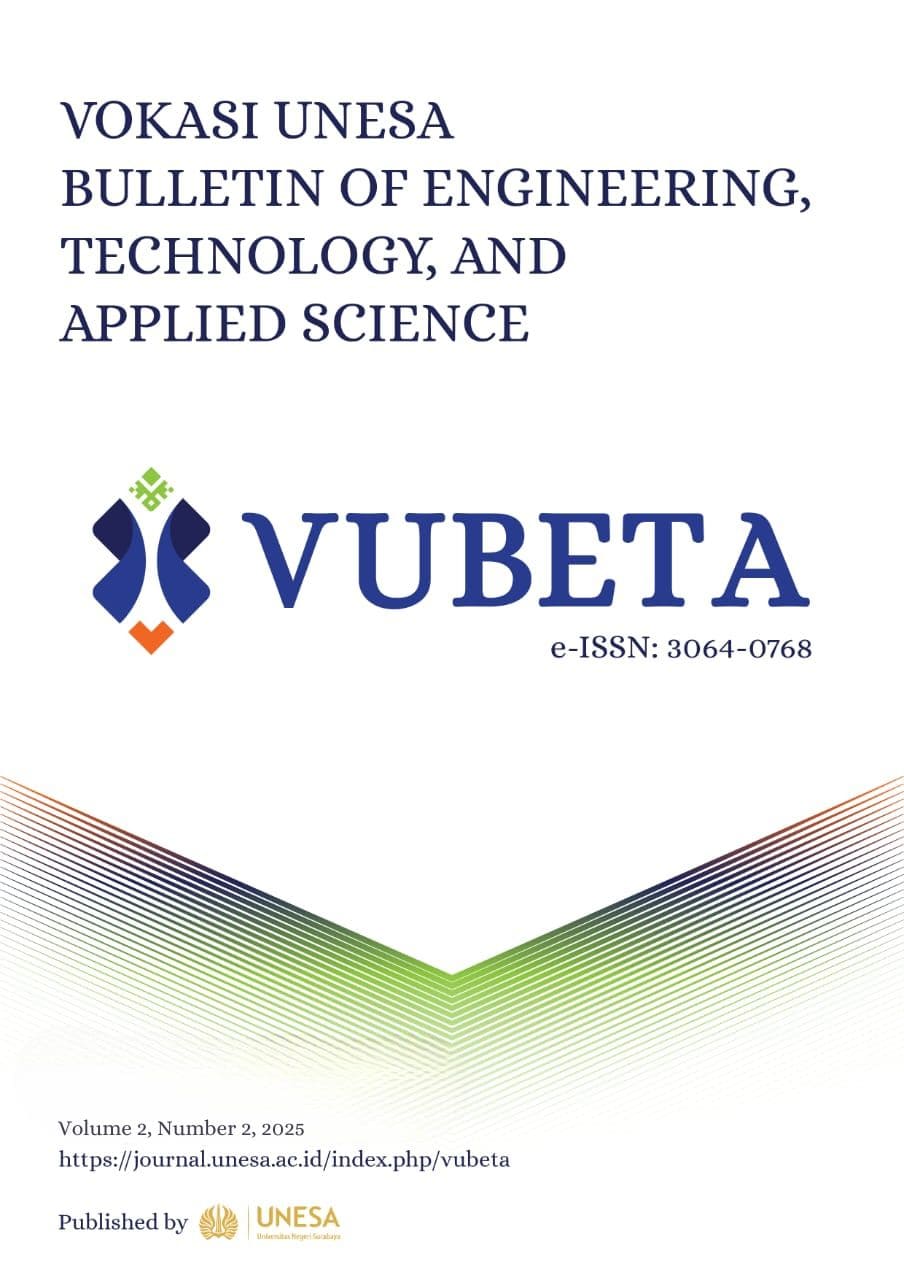The Use of Genetic Algorithm Optimization Approach In Comparison With Lambda Iteration Technique to Solve Economic Load Dispatch Problem.
DOI:
https://doi.org/10.26740/vubeta.v2i2.38275Keywords:
Economic load dispatch, Genetic Algorithm, Lambda iteration, optimizationAbstract
The increasing demand for efficient and reliable power generation systems has amplified the importance of solving Economic Load Dispatch (ELD) problems. This study compares the performance of two optimization techniques—Genetic Algorithm (GA), a robust metaheuristic approach, and Lambda Iteration, a traditional iterative method—on the IEEE 39-bus 10-generator test system. The analysis focuses on fuel cost minimization and computational efficiency. GA achieves a significant reduction in total fuel cost to $1390.29, outperforming Lambda Iteration's $2324.22. However, Lambda Iteration demonstrates faster convergence at 0.2 seconds compared to GA's 1.2 seconds. The results underscore the trade-offs between cost efficiency and computational speed, providing valuable insights into the suitability of advanced optimization methods like GA for complex ELD problems and the practicality of Lambda Iteration for simpler systems.
References
[1] A. Sabo, “A Review on Techniques Used for Solving the Economic Load Dispatch Problems: Categorization, Advantages, and Limitations”, Vokasi Unesa Bulletin of Engineering, Technology and Applied Science, vol. 2, no. 1, pp. 36–47, 2025. https://doi.org/10.26740/vubeta.v2i1.35591
[2] S. Gihare and P. Arun, “An Analysis of Optimization Based Algorithms Economic Load Dispatch in Power Systems,” International Journal of Advances in Engineering and Management, vol. 6, no. 08, pp. 116–121, 2024. https://doi.org/10.35629/5252-060811612.
[3] S. Jain and D. K. T. Chaturvedi, “Review on Economic Load Dispatch and Associated Artificial Intelligence Algorithms,” Smart Moves Journal Ijoscience, vol. 7, no. 3, pp. 34–42, 2021. https://doi.org/10.24113/IJOSCIENCE.V7I3.370
[4] Z. N. Jan, “Economic Load Dispatch using Lambda Iteration, Particle Swarm Optimization & Genetic Algorithm,” International Journal for Research in Applied Science and Engineering Technology, vol. 9, no. 8, pp. 972–977, 2021. http://dx.doi.org/10.22214/ijraset.2021.37527
[5] K. E. Fahim, L. C. D. Silva, F. Hussain, and H. Yassin, “A State-of-the-Art Review on Optimization Methods and Techniques for Economic Load Dispatch with Photovoltaic Systems: Progress, Challenges, and Recommendations,” Sustainability, vol. 15, no. 15, 2023. http://dx.doi.org/10.3390/su151511837
[6] M. B. B. M. 1D, R. K. Viral, P. M. Tiwari, “Solving Economic Load Dispatch Problem with Integrated Renewable Resources: A Comparative Analysis on Optimization Algorithms,” Journal of Electrical Systems, vol. 20, no. 7s, pp. 3730–3739, 2024.
[7] S. Kumar, V. Kumar, N. Katal, S. K. Singh, S. Sharma, and P. Singh, “Multiarea Economic Dispatch Using Evolutionary Algorithms,” Mathematical Problems in Engineering, vol. 2021, no. 7, pp. 1-14, 2021. http://dx.doi.org/10.1155/2021/3577087
[8] K. E. Fahim, L. C. De Silva, V. Andiappan, S. A. Shezan, and H. Yassin, “Research Article A Novel Hybrid Algorithm for Solving Economic Load Dispatch in Power Systems,” International Journal of Energy Research, vol. 2024, 2024. https://doi.org/10.1155/2024/8420107
[9] R. A. Abttan, A. H. Tawafan, and S. J. Ismael, “Economic Dispatch by Optimization Techniques,” International Journal of Electrical and Computer Engineering, vol. 12, no. 3, pp. 2228–2241, 2022. http://doi.org/10.11591/ijece.v12i3.pp2228-2241
[10] R. R. N. Ikhsan, J. Raharjo, and B. Rahmat, “Vectorized Lambda Iteration Method for Swift Economic Dispatch Analysis,” Evergreen, vol. 11, no. 1, pp. 435–447, 2024. http://dx.doi.org/10.5109/7172306
[11] Z. N. Jan and D. S. Saini, “Economic Load Dispatch Using Computational Techniques,” International Journal For Research in Applied Science and Engineering Technology., vol. 10, no. 12, pp. 831–834, 2022. http://dx.doi.org/10.22214/ijraset.2022.47977
[12] A. Aurasopon and C. Takeang, “Multiple Hybrid of Lambda Iteration and Bee Colony Optimization Method for Solving Economic Dispatch Problem,” International Journal on Electrical Engineering and Informatics, vol. 13, no. 1, pp. 57–72, 2021. http://dx.doi.org/10.15676/ijeei.2021.13.1.3
[13] J. Uhaa and A. Engla, “Lambda Iteration and Genetic Algorithms Application to solve the Economic Load Dispatch Problem of Seven Nigerian Thermal Power Plants,” Journal of Energy Technology and Policy, vol. 11, no. 4, pp. 45–54, 2021.
[14] W. Aribowo, “Comparison Study on Economic Load Dispatch Using Metaheuristic Algorithm,” Gazi University Journal of Science, vol. 35, no. 1, pp. 26–40, 2022. http://dx.doi.org/10.35378/gujs.820805
[15] H. Nourianfar and H. Abdi, “Environmental/Economic Dispatch Using a New Hybridizing Algorithm Integrated with an Effective Constraint Handling Technique,” Sustainabillity, vol. 14, no. 6, 2022. https://doi.org/10.3390/su14063173
[16] N. Kumar, “A Genetic Algorithm Approach for the Solution of Economic Load Dispatch Problem,” International Journal on Computer Science and Engineering, vol. 4, no. 6, pp. 1063–1068, 2012.
[17] A. M. Kabir et al., “Optimized Economic Load Dispatch with Multiple Fuels and Valve-Point Effects using Hybrid Genetic–Artificial Fish Swarm Algorithm,” Sustainabillity, vol. 13, no. 19, pp. 1–27, 2021. http://dx.doi.org/10.3390/su131910609
[18] M. S. Brar and G. S. Brar, “Economic Load Dispatch using IYSGA,” European Journal of Theoretical and Applied Sciences, vol. 2, no. 1, pp. 595–606, 2024. http://dx.doi.org/10.59324/ejtas.2024.2(1).52
[19] M. Khan, M. A. Shafi, and M. S. K. Khosa, “An Analysis of Stochastic Wind Power Approach for Economic Load Dispatch Optimization using Genetic Algorithm,” Southern Journal of Engineering & Technology, vol. 1, no. 2, 2023.
[20] F. Marzbani and A. Abdelfatah, “Economic Dispatch Optimization Strategies and Problem Formulation: A Comprehensive Review,” Energies, vol. 17, no. 3, pp. 1–31, 2024. http://dx.doi.org/10.3390/en17030550
[21] T. Athay, R. Podmore, and S. Virmani, “A Practical Method for the Direct Analysis of Transient Stability,” EEE Transactions on Power Apparatus and Systems, vol. PAS-98, no. 2, pp. 573–584, 1979. https://doi.org/10.1109/TPAS.1979.319407
Downloads
Published
How to Cite
Issue
Section
License
Copyright (c) 2025 Sadiq Buba, Engr. Dr. Sabo Aliyu (Ph.D) MIEEE. PES. (Member, IEEE), Olutosin Ogunleye, Kabir Mohammed , Samuel Ephraim Kalau, Daramdla P. Olaniyi

This work is licensed under a Creative Commons Attribution-ShareAlike 4.0 International License.
 Abstract views: 276
,
Abstract views: 276
, PDF Downloads: 377
PDF Downloads: 377









